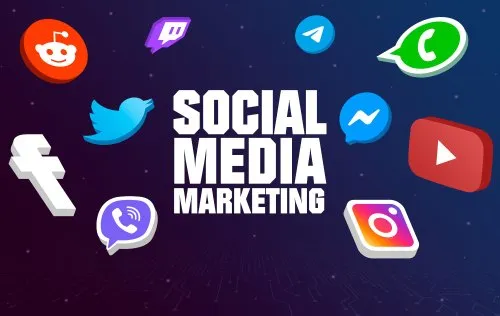Social Media Marketing
Social media marketing is a digital marketing strategy that involves using social media platforms to connect with your target audience, build your brand, promote products or services, and achieve various business goals. Social media has become an integral part of modern marketing because it provides a direct line of communication with customers and offers numerous opportunities for engagement.
Platform Selection: Choose the social media platforms that align with your target audience and business objectives. Popular options include Facebook, Instagram, Twitter, LinkedIn, Pinterest, TikTok, and more.
Audience Research: Understand your target audience’s demographics, interests, behaviors, and pain points. This knowledge helps tailor your content and engagement strategies.
Content Strategy:
- Create a content calendar that outlines what type of content you’ll post and when.
- Develop content that is valuable, relevant, and engaging. This can include text, images, videos, infographics, and more.
- Use storytelling to connect with your audience on a personal level.
Community Building:
- Build and nurture a community of followers, fans, and customers on social media.
- Engage with your audience by responding to comments, messages, and mentions.
Paid Advertising:
- Use paid social media advertising to reach a wider audience and promote your content or products.
- Set up targeted ad campaigns based on demographics, interests, and behavior.
Influencer Collaboration:
- Partner with influencers in your niche to expand your reach and gain credibility.
- Influencers can promote your brand or products to their followers.
Hashtags: Use relevant hashtags to increase the discoverability of your content. Research and choose hashtags that are popular among your target audience.
Analytics and Tracking:
- Monitor the performance of your social media efforts using analytics tools provided by the platforms.
- Track metrics such as engagement, reach, click-through rates, and conversion rates.
Consistency: Maintain a regular posting schedule to keep your audience engaged and informed. Consistency builds brand trust and reliability.
User-Generated Content:
- Encourage customers to create and share content related to your brand or products.
- Repost or share user-generated content to showcase authenticity and customer loyalty.
Contests and Giveaways:
- Run contests or giveaways to boost engagement, generate user-generated content, and increase brand visibility.
Crisis Management: Be prepared to handle negative comments or crises on social media promptly and professionally. A well-managed crisis can protect your brand’s reputation.
A/B Testing: Experiment with different content formats, posting times, and ad variations to determine what resonates best with your audience.
Social Listening: Monitor conversations related to your brand, products, or industry on social media. Gain insights into customer sentiment and emerging trends.
Mobile Optimization: Ensure that your social media content is mobile-friendly, as a significant portion of users access social platforms through mobile devices.
Legal Compliance: Comply with social media advertising regulations and data protection laws to avoid legal issues.
Social media marketing is a dynamic field that requires adaptability and a deep understanding of your audience. It’s essential to be responsive, authentic, and respectful in your interactions with users on social platforms.

